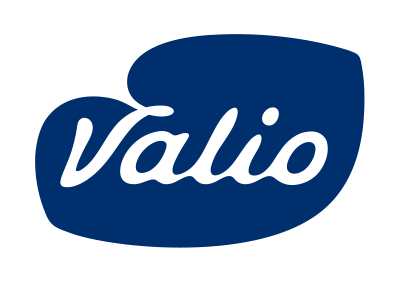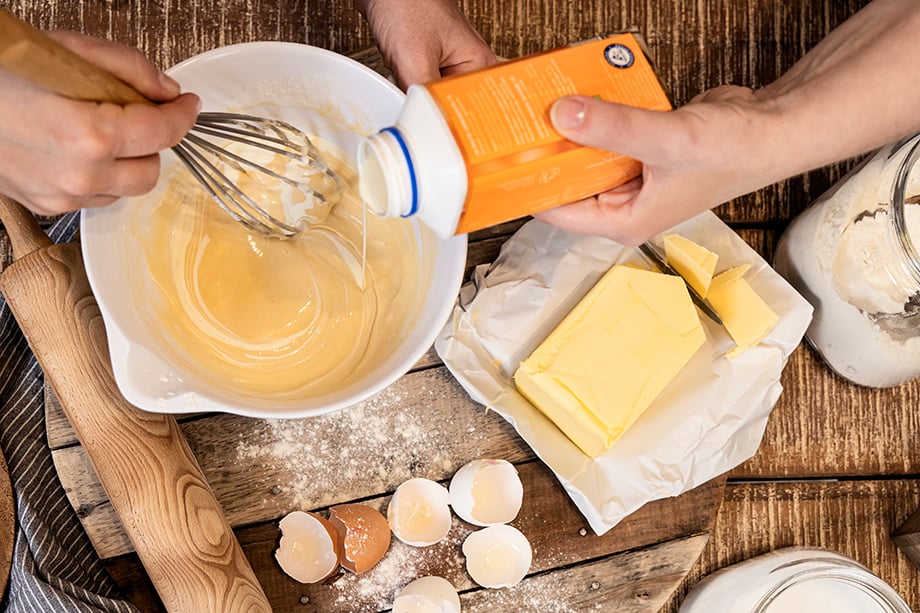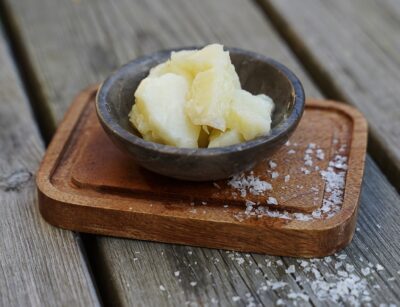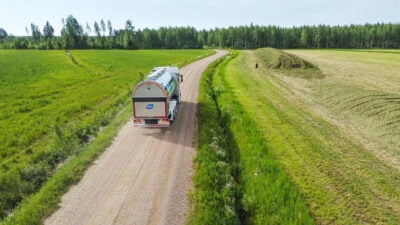Valio Group net sales in 2020 were EUR 1,808 million (2019: EUR 1,787 million), up 1.2% on the previous year. Domestic net sales decreased by 0.9 percent, and international net sales rose 4.3 percent. The coronavirus pandemic affected domestic consumption and was visible in the growth in retail sales and the decrease in HoReCa sales. However, in the challenging year Valio was able to slightly improve the milk return*.
The coronavirus pandemic affected our operations in all markets. People stayed at home and cooked for themselves, boosting retail sales. Eating in restaurants and staff canteens fell away, so hotel, restaurant and catering (HoReCa) sales decreased.
Retail sales grew in Finland
“Despite the coronavirus pandemic, Valio recorded a good financial performance and the milk return continued to grow. I am especially proud of the fact that, in spite of the challenging year, we were able to secure our employees’ health and wellbeing, and we were able to maintain normal production and excellent delivery reliability. One of our strengths is flexible production capacity, so we were able to shift production quickly from large package sizes designed for restaurants to consumer packages. Additionally, demand in our export markets grew, despite the pandemic,” says Valio’s CEO Annikka Hurme.
The impacts of the pandemic were clearly visible in domestic consumption, as it shifted from eating in restaurants to home cooking. Consumer buying power weakened in the course of the coronavirus pandemic, so we launched more items under the Valio Hyvä suomalainen Arki® brand.
The market for plant-based products also continued to grow. Valio Oddlygood® Barista became a favourite with consumers in Finland. During the year Valio launched Valio Oddlygood® Veggie grated, which is used like cheese.
China accelerated international sales growth
Net sales from international operations totalled EUR 746 million (EUR 715 million). The growth was strongest in China, where demand recovered quickly after the coronavirus shock in early 2020, and net sales increased by more than 40 percent on the previous year.
“Despite the growth, Valio is a small actor in China. Our most important task is to further improve the profitability of exports and to build recognition of our products and brand,” Hurme says.
Growth in net sales in the nearby markets of Sweden, Estonia, and Russia was moderate. In the US, the pandemic caused steep price fluctuations, which weakened financial performance, but net sales remained at a reasonably level. After a slump early in the year, the global market price of milk powders began to rise towards the end of the year.
Valio pays all its profits to its owners
Valio is owned by 4,300 Finnish milk producers, and Valio pays its operating profit to the dairy farms through the co-operatives. Valio’s financial success is measured with a milk margin* and a milk return**.
The milk margin amounted to EUR 861 million (EUR 838 million), and the milk return was 41.5 cents per litre (41.2 c/l).
Valio’s Board of Directors, which is comprised of milk producers, determines the raw milk price based on the market situation and Valio’s financial standing. In 2020, the average price Valio paid for milk was 40.9 cents per litre (39.9 c/l). The price included after payments of 1.5 cents per litre paid to the co-operatives. The sustainability bonus to encourage the continuous improvement of animal welfare remained at two cents per litre.
Throughout the 2000s, Valio has been able to pay Finnish milk producers a higher price for milk than the European average.
Valio updated its strategy
Valio’s strategy was updated in 2020. In its operations, Valio will focus on four areas to pursue future growth.
“Business operations focusing on milk in the domestic market continue to be the strongest of these, and we will continue its further development. Raw materials and solutions that generate added value especially for our industrial customers is an important new focus area, whereby we are seeking growth globally, for example in Asia. We also see potential for growth in plant-based products, where we are further developing our offering as well as looking to export markets. In addition, we are continuously evaluating various new business opportunities and new partnerships,” notes Annikka Hurme.
Valio is part of the climate change solution
Valio continued the ambitious climate work in 2020. Our goal is to cut the carbon footprint of the entire milk chain – from farm to grocery store – to zero by 2035.
Valio set Science Based Targets on climate in 2020. According to the targets, greenhouse gas emissions from milk production per litre of raw milk taken in will be halved by 2030, compared with 2019.
Valio continued training dairy farmers in carbon farming. Due to the coronavirus pandemic, Valio invested in an electronic learning platform, in collaboration with the environmental foundation Baltic Sea Action Group. The platform went live in early 2021.
In October Valio launched an environmental calculator for all Valio dairy farms, enabling them to calculate the carbon footprint of the milk produced at their farm. Valio also initiated training in the use of the calculator.
Valio continued studies on using cattle manure in biogas production to reduce climate impacts. The first milk truck using biogas produced at a farm commenced milk collection at the beginning of 2021.
In late 2020 a biogas station was opened at the Vuorenmaa dairy farm in Haapavesi; vehicles can fill up with biogas made from cow manure. There is enough to supply the milk truck as well as other gas-powered vehicles, and it can be purchased from a normal gas pump. Biogas will have an important role in the future as a reducer of transportation emissions because it will replace fossil fuels, i.e. diesel and gasoline. At the same time, the dairy farm’s carbon footprint is significantly decreased.
Valio started a three-year project together with the Natural Resources Institute Finland, which will focus on studying cultivation methods that reduce emissions from peatlands. In addition, ten measurement chambers were installed at four Valio dairy farms to measure soil carbon balance.
As of the beginning of 2021, all 4,300 dairy farms meet Valio’s sustainability criteria for animal well-being and receive a sustainability bonus for their work. The requirements include, for example, preventive health care for the cows and systematic monitoring of their welfare.
Improving efficiency continued in 2020
Valio’s goals in 2020 were to increase net sales and improve profitability. The three-year programme introduced in 2018 to improve cost efficiency, profitability, and competitiveness proceeded well and will continue to the end of 2021. The coronavirus pandemic raised costs, and some project implementations had to be postponed. The pandemic also meant that some jobs were temporarily discontinued, and we conducted cooperation negotiations in spring 2020, which resulted in lay-offs in head office functions.
Contract production secures future milk production
Valio and the milk procurement co-operatives switched to contract production at the beginning of 2021. Contract production means that the milk procurement co-operatives supply a pre-agreed volume of raw milk to Valio. The goal is to secure the future of dairy farms in both the medium and long term and to maximise the price paid for raw milk to the co-operatives and, consequently, to the dairy farmers. Better predictability of the total milk volume is necessary so that Valio can adjust its production capacity to market demand.
Contract production secures the sufficiency of powder manufacturing capacity, and in 2020 sales of value-added powders grew by 10 percent. The use of value-added powders enables, for instance, a chocolate manufacturer to reduce a product’s sugar content without changing the taste, or the powders offer some other advantage for customers. In Finland, a new packaging plant for consumer powders was built in Lapinlahti, and the Seinäjoki powder drying tower’s production capacity was increased. These investments are preparing Valio to grow its exports of value-added powders.
Year 2021
The first half of 2021 started with a continuation of the coronavirus pandemic. Looking after the health of our personnel and dairy farmers and keeping production going remain our priorities.
In line with strategic focus areas, Valio will continue to invest in new growth, operational efficiency, and improved profitability in 2021. As a result of contract production, there has been a moderate decrease in raw milk volumes since the beginning of the year.
The coronavirus pandemic continues to make operations difficult for our restaurant, hotel and industrial kitchen customers. On the other hand, retail demand is on a good level. The market situation for butter and milk powders seems positive globally, and we see growth potential especially in the value-added powder business in China and elsewhere in Asia, for example.
“A key issue regarding product exports, as well as importing ingredients and supplies, is whether international borders will remain open. Valio’s strength is that milk, the most important ingredient of our products manufactured in Finland, is produced locally, at Valio owners’ dairy farms. Products are manufactured at 12 plants, which helps to ensure security of supply. Valio plays an important role in Finland also in ensuring food security, and in all our operations we aim to serve customers and consumers in the best possible way,” notes Annikka Hurme.
Valio Group’s key figures in 2020
| 2020 | 2019 | Change | |
| Net sales, MEUR | 1,808 | 1,787 | 1.2% |
| Milk margin, MEUR | 861 | 838 | 2.7% |
| Milk return c/l | 41.5 | 41.2 | 0.7% |
| Milk volume, ML | 1,807 | 1,792 | 0.8% |
| Equity assets ratio | 50% | 48% | 4.2% |
| Investments, MEUR | 61 | 64 | -4.7% |
*Milk return: Milk margin less estimated required financing for investments, and the figure is divided by the milk volume taken in from the owners of Valio Ltd.
**Milk margin: Net sales less all other costs excluding the price paid to the owners for raw milk, interest on shareholder loans, depreciation according to plan, supplementary payments to the pension fund, pension contribution refunds, and items not included in actual business operations, such as sales gains from sales of business operations, provisions, sales gains and losses from real estate sales, write-offs of non-current assets, and costs arising from acquisitions of companies and business operations. The milk margin includes taxes for appropriations, and the tax effect of Valio Ltd profit less the tax share of the net profit corresponding to the amount of the average dividend percentage from the share capital.
Valio’s Board of Directors’ Report and Financial Statements and sustainability report will be published on 9 June 2021.




